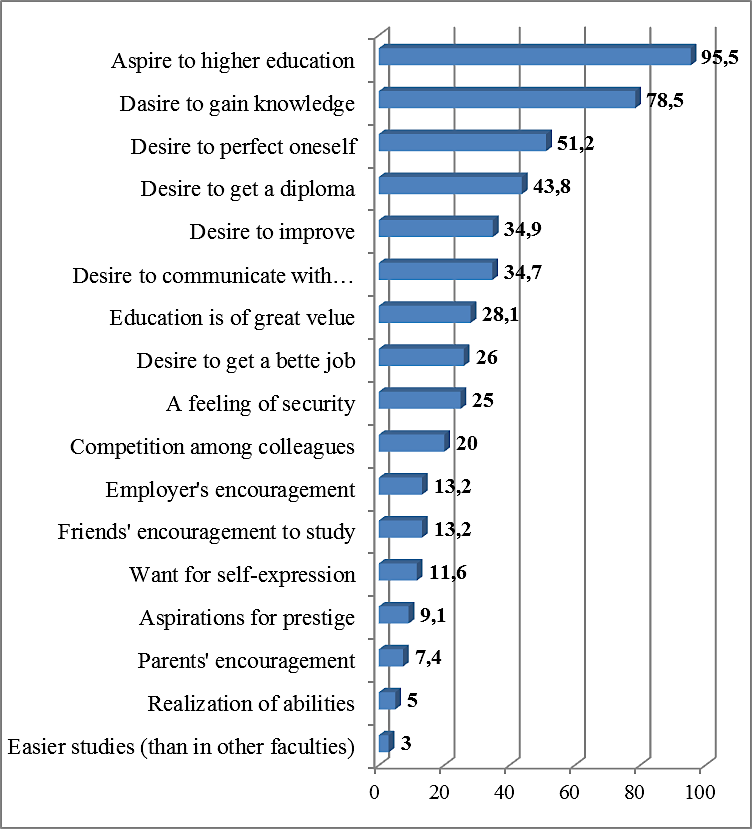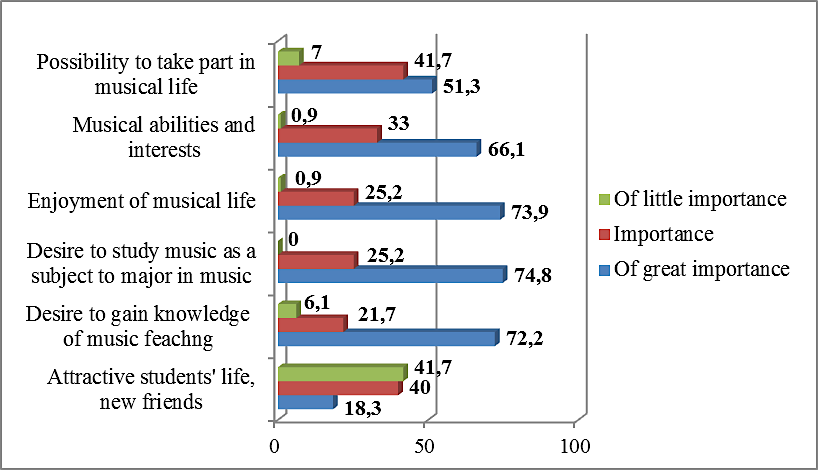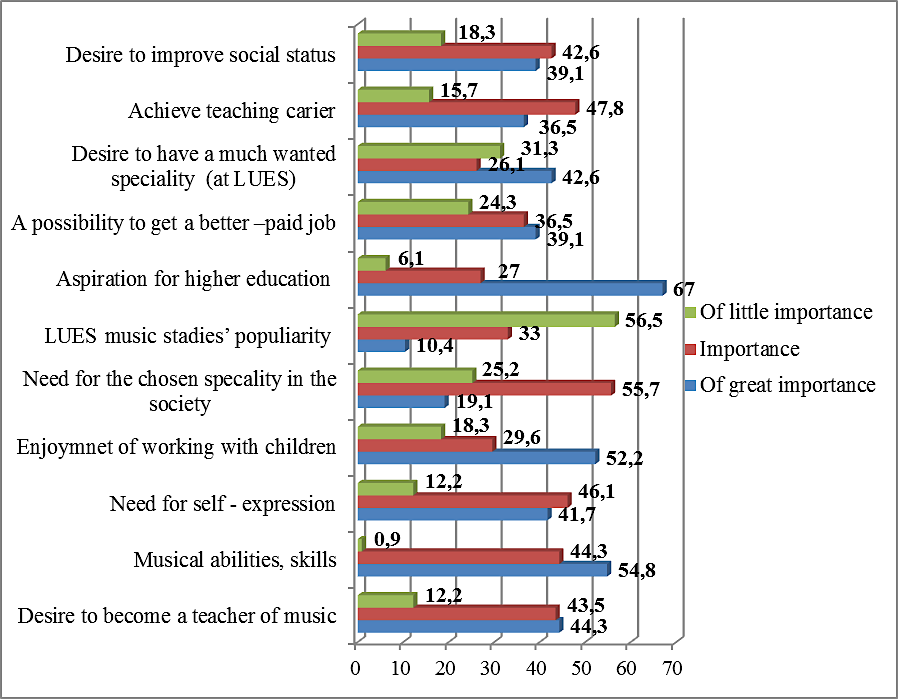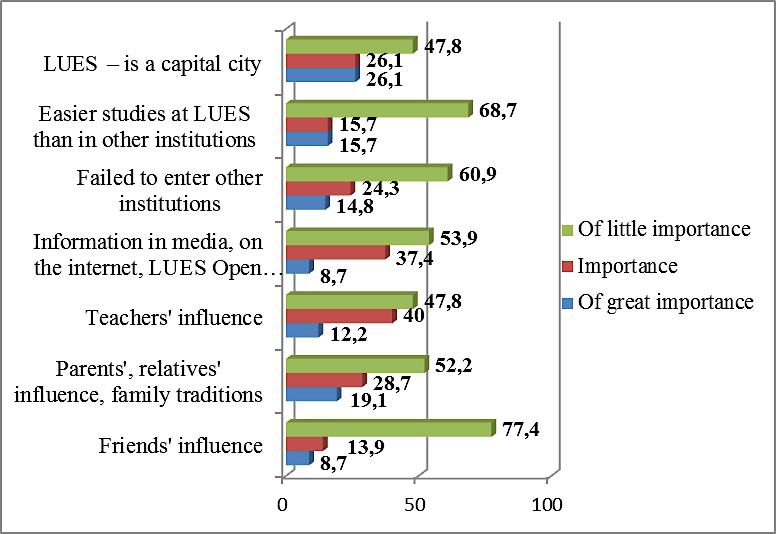Abstract
The article analyses the factors that influence students when choosing the profession of a music teacher. Nowadays, the modern competitive labour market situation has resulted in many difficulties which require the younger generation to adapt to compare to other age groups. People who are seeking employment require more qualifications which is why it is very important to highlight those factors, which are related to the choice of profession. Choosing a profession is an important and complex process which makes a tremendous impact on the person’s life. This study investigated preservice music teachers’ views on the music teacher’s profession and possible changes in them in the years of study. This research reveals would- be music teachers’ priorities and
so
possible changes in the study programme that could be made. The most conspicuous factors are: the desire to major in music, go in for musical activity, and acquire a better professional knowledge in musical education. The factors related to professional purposefulness are also extremely important i.e. ability and skills in music, enjoyment of working with children. Also aspirations for a higher education, a desire to improve oneself and communicate with others are important, too. The research analysis has proved to be useful in improving of music teachers' training.
Keywords: Professional choicesmusic teacherfactorsteacher training
Introduction
Choosing a profession is an important and complex process which makes a tremendous impact on the person‘s life. A successful professional career is possible on condition the person realizes his ambitions; his profession corresponds with personal interests and likings (Spittle & Spittle, 2014). Choosing a profession is a continuous, long-lasting process. It starts with the years of study but it may continue on completion of studies and starting the working career. Thus it is an erroneous view to consider one‘s professional decision as a single act because both the person and profession content keep changing (Mizell, 2010). So the phenomenon nature changes – from one occasion into a continuous process. So we can state that choosing a profession is predetermined by 2 basic factors: the outer necessity i.e. by environment requirements and the person‘s inner motivation, determination, conscious perception in choosing and planning one‘s profession.
Problem Statement
Present-day competitive labour market situation makes it more difficult for the young to find work. As people looking for employment meet higher requirements, it is very important to select the factors related to professional choices. It is the motive that influences every activity and its success. Scientists point out that it is highly important to know the motivation factors so as to regulate and direct them because the activity and cooperation purposefulness as well as the intensity can be changed by changing the motives (Richardson, Karabenick, & Watt, 2014). The problems of factors in choosing professions were analysed by Green and Greive (2007), Watt, Richardson and Wilkins (2014), Gore, Holmes, Smith, and Fray (2016) and in other research articles. Biggs (1987) and Jovaiša (2009) had laid the theoretical models of the factors analysis in choosing profession. The problems of professional self-determination among the young have been analysed by scientists like Struyven, Jacobs, and Dochy (2013), Fokkens-Bruinsma and Canrinus (2014).
A music teacher’s profession is exceptional because the young usually make a decision to go in for music at an early age. Gifted for music children usually start playing musical instruments, singing by choosing musical training activities or specialized musical schools. Music requires much devotion and hard work. Music studies are generally recognized as a specific subject in higher education. Unlike other professions, future music students enter a University having acquired high standard skills in musical training. Candidates have to take entrance exams during which professional musicians’ board examine their special musical abilities and skills and select the best. Also, candidates take a test in motivation which has been included in order to perfect teachers’ training. Besides special personal character qualities experience, goals and expectations are also important for the music teacher in his future pedagogical work. Thus, a desire to major in music teaching as a profession means one’s determination to study the inexhaustible field which is wide, rich, complex and complicated. Questions on professional training of music teachers had been analysed by Rauduvaitė and Ramanauskienė (2010), Della, Bidner, and Devaney (2010) and others. The factors for choosing music teacher’s profession have been fragmentarily analysed in different countries (McPherson & O’Neill, 2010; Schnare, MacIntyre, & Doucette, 2012). Research articles on the factors for choosing music teacher’s profession as a speciality aspect in universities of Lithuania have not been found.
These are the essential conditions aiming at the factors influencing students on choosing music teacher’s profession. Thus, carrying out research on the choice of the factors, it is important to investigate students’ views on music teacher’s profession and possible changes in them in the years of study. This sort of research reveals would – be teachers’ of music priorities and so possible changes in the study programme could be made.
Research Questions
The main question of this research is: What are the factors that influence the choice of music teacher profession?
Purpose of the Study
The purpose of study is to investigate the factors that influence the choice of music teacher‘s profession.
The study wants to define the factors for choosing music teacher’s profession in bachelor of Music Education study programme, to understand major expectations of Lithuanian preservice music teachers from teaching.
Research Methods
The research was done using a written questionnaire. The researcher developed the questionnaire specifically for the research with items dealing with theimportance of factors in choosing music education studies. The open and closed questions given to Bachelor's students was devised on the basis of theoretical conceptions and teacher’s profession models (Holland, 1959; Biggs, 1987; Jovaiša, 2009; Richardson et al., 2014), supplementing them with statements about music teachers profession as a speciality aspect.
The quantitative data was analyzed using “MS Excel” program and descriptive statistics (absolute and percentage frequencies were calculated).
The 1st research stage lasted from 2013 to 2014 in which 125 Lithuanian University of Educational Sciences (LUES), the 1st and 2nd year students, preservice music teachers, bachelor of Music Education study programme took part. The 2nd research stage took place from 2016 to 2017, 114 3rd and 4th year students doing the course of study of Music Education participated.
The research ethics was grounded on the principles of goodwill, voluntarism, confidentiality, explicit informing and respect for the dignity of an individual. Students agreed with carrying out of the research in particular university.
Findings
Figure
The data in Figure

In the second stage of the research third and fourth year students’ factors for choosing music teaching studies were revealed. Profession choice is a complex phenomenon which is predetermined by various motives. It (profession choice) is the choice of a particular professional activity which is closely related to the person’s interests, abilities, possibilities and labour market demand (McPherson & O’Neill, 2010). On the basis of other researchers’ work (Jovaiša, 2009; Eren & Tezel, 2010) six groups of factors have been picked out like: factors related to professional goals, higher education, cognitive factors, personal factors, other people’s influence and others.
Three fourths of the respondents (see figure

Analysing the factors related to professional purposefulness (see figure

Friends’ influence is the least important factor for future music teachers (see figure

Respondents were openly asked about their future expectations when they graduated. It has been noticed that the students' motives of decision-making about their profession are unchanged, they want to acquire this profession and stick to their firm belief:
The analysis of the factors that influence the choice of music teacher‘s profession is only one in the context of professional training choice. The limitation of this research is that the non-probability sample was chosen and the obtained results cannot be generalized but they are useful disclosing the possibilities and variety of development of music teacher professional training.
Conclusion
LUES music teaching students chose their profession paying great significance to educational motives: desire to study music as a subject, desire to indulge in musical activity, and wish to gain more music teaching professional competence purposefulness are also important musical abilities and skills, enjoyment of working with children. More than two thirds of the respondents found aspiration for a higher education of great importance. Other people – friends’, parents’, relatives’ influence and family traditions were the least important motives. Also, there were less important motives like: LUES easier studies than in other institutions, failure to enter other schools and the popularity of music studies at LUES.
The research data shows that a greater number of the students have well considered the choice of their profession. The research data also proved that aspiration for a higher education was one of the most important factors and incentives. Other factors were: desire to gain knowledge, need for raising qualification and competence desire to perfect oneself, get a diploma and wish to communicate with others.
It was determined that during studies students' satisfaction (qualitative content analysis) manifests itself in the strengthening of vocational orientation, which is determined by the quality of studies, the fulfillment of expectations, emerged needs satisfaction and the usefulness of pedagogical practice. During their studies preservice music teachers find out the viability of their specialty, the meaning of working in pedagogical area and realizing themselves in communicating with children. They note that they are satisfied with the study program, the qualifications of lecturers and the ability to teach their subject. The research results also showed that there are students with a lack of professional orientation, which is associated with doubt, the emergence of problems and disappointment.
Acknowledgments
We thank to our students who took part in the interviews, colleagues who assisted us, Music Department and Lithuanian University of Educational Sciences.
References
- Biggs, J. (1987). Student approaches to learning and studying. Melbourne: Australian Council for Educational Research.
- Della, P. C., Bidner, S., & Devaney, T. (2010). Preservice elementary classroom teachers’ attitude toward music in the school curriculum and teaching music. Research & Issues in Music Education, 8(1), 1-15.
- Eren, A., & Tezel, K. V. (2010). Factors influencing teaching choice, professional plans about teaching, and future time perspective: A mediational analysis. Teaching and Teacher Education, 26(7), 1416-1428.
- Fokkens-Bruinsma, M., & Canrinus, E. T. (2014). Motivation for becoming a teacher and engagement with the profession: Evidence from different contexts. International Journal of Educational Research, 65, 65-74.
- Gore, J., Holmes, K., Smith, M., & Fray, L. (2016). Investigating the factors that influence the choice of teaching as a first career. Brisbane: Queensland College of Teachers.
- Green, R., & Greive, C. (2007). Factors that influence the desire to become teachers of technology: An Australian study. TEACH Journal of Christian Education, 1(1), 10.
- Holland, J. L. (1959). A theory of vocational choice. Journal of Counseling Psychology, 6(1), 35–45.
- Jovaiša, L. (2009). Profesinio orientavimo ir konsultavimo psichologija. Vilnius: Agora.
- Kontvainas, R. (2011). Certain peculiarities of the geography study programme for preparation of students for future professional activities. Pedagogy, 101, 63-68.
- McPherson, G., & O’Neill, S. (2010). Students’ motivation to study music as compared to other school subjects: A comparison of eight countries. Research Studies in Music Education, 32(2), 101-137.
- Mizell, H. (2010). Why professional development matters. Oxford: Learning Forward.
- Rauduvaitė, A., & Ramanauskienė, D. (2010). Future music teachers‘ personal career: choice of profession. Pedagogy, 99, 104-112.
- Richardson, P. W., Karabenick, S. A., & Watt, H. M. G. (2014). Teacher motivation: theory and practice. New York, NY: Taylor & Francis.
- Rodzevičiūtė, E. (2008). Pedagogo profesijos pasirinkimo motyvacija ir jos kaita pedagoginių studijų metu. Profesinis rengimas: tyrimai ir realijos, 15, 74–85.
- Schnare, B., MacIntyre, P. D., & Doucette, J. (2012). Possible selves as a source of motivation for musicians. Psychology of Music, 40, 94-111.
- Spittle, S., & Spittle, M. (2014). The reasons and motivation for pre-service teachers choosing to specialise in primary physical education teacher education. Australian Journal of Teacher Education, 39(5), 5.
- Struyven, K., Jacobs, K., & Dochy, F. (2013). Why do they want to teach? The multiple reasons of different groups of students for undertaking teacher education. European Journal of Psychology of Education, 28(3), 1007-1022.
- Watt, H. M. G., Richardson, P. W., & Wilkins, K. (2014). Profiles of professional engagement and career development aspirations among USA preservice teachers. International Journal of Educational Research, 65, 23-40.
- Whitbeck, D. A. (2000). Born to be a teacher: What am I doing in a college of education? Journal of Research in Childhood Education, 15(1), 129-136.
- Zulumskytė, A. (2003). Pedagogų tęstinio ugdymo(si) ypatumai universitetinėse studijose. Profesinis rengimas: tyrimai ir realijos, 6, 156–163.
Copyright information

This work is licensed under a Creative Commons Attribution-NonCommercial-NoDerivatives 4.0 International License.
About this article
Publication Date
14 January 2019
Article Doi
eBook ISBN
978-1-80296-052-5
Publisher
Future Academy
Volume
53
Print ISBN (optional)
-
Edition Number
1st Edition
Pages
1-812
Subjects
Education, educational psychology, counselling psychology
Cite this article as:
Abramauskiene, J., & Kirliauskiene, R. (2019). The Factors That Influence The Choice Of Music Teacher’s Profession. In Z. Bekirogullari, M. Y. Minas, & R. X. Thambusamy (Eds.), ICEEPSY 2018: Education and Educational Psychology, vol 53. European Proceedings of Social and Behavioural Sciences (pp. 113-121). Future Academy. https://doi.org/10.15405/epsbs.2019.01.11

